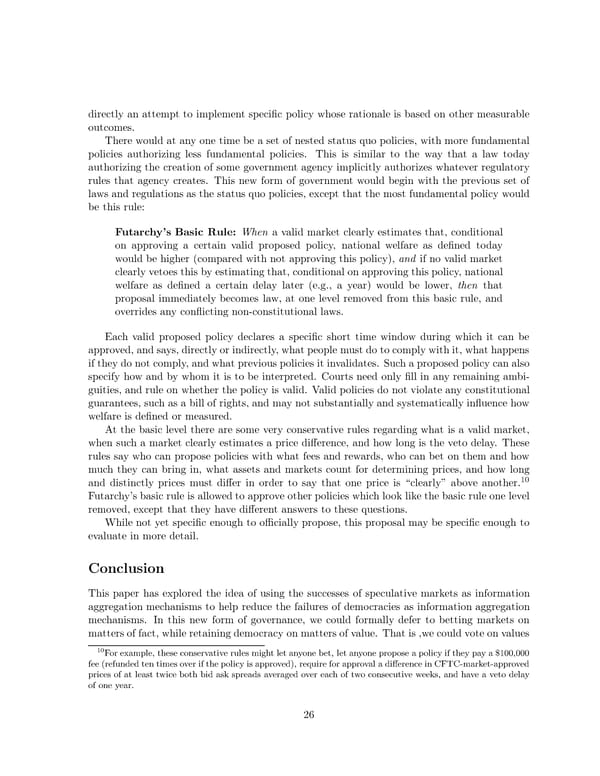directly an attempt to implement specific policy whose rationale is based on other measurable outcomes. There would at any one time be a set of nested status quo policies, with more fundamental policies authorizing less fundamental policies. This is similar to the way that a law today authorizing the creation of some government agency implicitly authorizes whatever regulatory rules that agency creates. This new form of government would begin with the previous set of laws and regulations as the status quo policies, except that the most fundamental policy would be this rule: Futarchy’s Basic Rule: When a valid market clearly estimates that, conditional on approving a certain valid proposed policy, national welfare as defined today would be higher (compared with not approving this policy), and if no valid market clearly vetoes this by estimating that, conditional on approving this policy, national welfare as defined a certain delay later (e.g., a year) would be lower, then that proposal immediately becomes law, at one level removed from this basic rule, and overrides any conflicting non-constitutional laws. Each valid proposed policy declares a specific short time window during which it can be approved, and says, directly or indirectly, what people must do to comply with it, what happens if they do not comply, and what previous policies it invalidates. Such a proposed policy can also specify how and by whom it is to be interpreted. Courts need only fill in any remaining ambi- guities, and rule on whether the policy is valid. Valid policies do not violate any constitutional guarantees, such as a bill of rights, and may not substantially and systematically influence how welfare is defined or measured. At the basic level there are some very conservative rules regarding what is a valid market, when such a market clearly estimates a price difference, and how long is the veto delay. These rules say who can propose policies with what fees and rewards, who can bet on them and how much they can bring in, what assets and markets count for determining prices, and how long and distinctly prices must differ in order to say that one price is “clearly” above another.10 Futarchy’s basic rule is allowed to approve other policies which look like the basic rule one level removed, except that they have different answers to these questions. While not yet specific enough to officially propose, this proposal may be specific enough to evaluate in more detail. Conclusion This paper has explored the idea of using the successes of speculative markets as information aggregation mechanisms to help reduce the failures of democracies as information aggregation mechanisms. In this new form of governance, we could formally defer to betting markets on matters of fact, while retaining democracy on matters of value. That is ,we could vote on values 10For example, these conservative rules might let anyone bet, let anyone propose a policy if they pay a $100,000 fee (refunded ten times over if the policy is approved), require for approval a difference in CFTC-market-approved prices of at least twice both bid ask spreads averaged over each of two consecutive weeks, and have a veto delay of one year. 26
 Shall We Vote on Values, But Bet on Beliefs? Page 27 Page 29
Shall We Vote on Values, But Bet on Beliefs? Page 27 Page 29